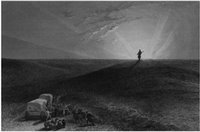 Re-Reading the Early Republic: From Crèvecoeur to Cooper
Re-Reading the Early Republic: From Crèvecoeur to CooperThe American Antiquarian Society 2007 Summer Seminar
June 18–22, 2007
Seminar Director: Wayne Franklin, University of Connecticut at Storrs
Visiting Faculty: Lance Schachterle, Associate Provost, Worcester Polytechnic Institute; Jeffrey Walker, Associate Professor of English, Oklahoma State University; David Whitesell, Curator of Books, AAS
"Re-reading the Early Republic" will explore the expansion of the press as an element in American public culture from the end of the Revolution to 1830. This was a period of remarkable growth in both the number and nature of items published and in the role of the press in public life. Paying particular attention to the practices of textual production as these evolved across the five decades, we shall be concerned with three key issues: 1) authorial practices -- how writers conceived and produced their texts as both intellectual constructs and material artifacts; 2) printing and publishing practices -- how texts moved from manuscript to print and then to and through the market; and 3) reading practices -- how books were owned and understood by individual readers, as well as how they were handled in and by the periodical press. To focus these concerns, we shall look at a trio of examples from the period. The first is provided by the French émigré essayist St. Jean de Crèvecoeur: we shall consider how he wrote and organized Letters from an American Farmer (1782) and its associated texts (both the so called Sketches of Eighteenth-Century America and the "Agricola" papers, as well as the two vastly expanded French "translations" of Letters), and how parts of these texts were re circulated in the American periodical press. The second example centers on how the various texts penned by members of the Lewis and Clark Expedition in 1803-1806 were edited and altered as they began to make their way into print, especially how the key contemporary record of expedition, the 1814 Paul Allen Nicholas Biddle History, shaped immediate public understanding of the Louisiana Territory. The third example centers on the immensely popular fiction of James Fenimore Cooper, whose authorial practices from 1820 to 1830 were experimental both conceptually and in terms of how they were produced for Cooper's growing public in the United States and abroad. This part of the seminar will make special use of the riches in the Antiquarian Society's Cooper collection, including manuscripts of various published works, correspondence with his literary agents and publishers, and other documents. Finally, since all three of these examples from the period have undergone exhaustive re editing in the past thirty years, we shall ask how modern editorial treatment of texts alters the way in which an earlier period is -- and should be -- read and understood. Our primary reading will be Letters from An American Farmer and Sketches of Eighteenth Century America, ed. Albert E. Stone, Gary E. Moulton's Definitive Journals of the Lewis and Clark Expedition (both on-line and the one volume abridgement), and the Cooper edition's version of The Red Rover, ed. by Thomas and Marianne Philbrick.
More information available here

<< Home